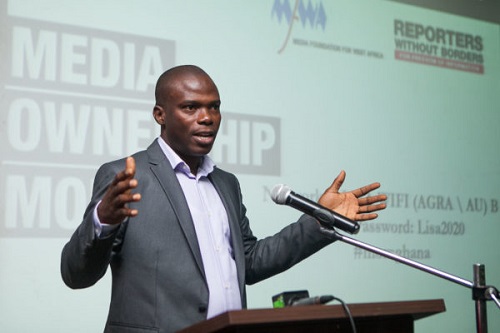The Media Foundation for West Africa (MFWA) has described as an impediment to the Right to Information Law, the ruling of the High Court to allow the National Communications Authority (NCA) charge fees for requesting information on the closure of some radio stations.
Executive Director of the Foundation, Mr Sulemana Braimah said the court ruling will undermine the extent to which ordinary citizens can use the RTI Law to hold public officers accountable.
Speaking to Evans Mensah on JoyNews' PM Express Monday, Mr Braimah indicated that the RTI law was not intended to make public institutions sell information to individuals and organisations that request them.
"I think that the decision of the court certainly undermines the Right to Information and the extent to which people can use it to seek information. Because essentially we were asking the NCA to give us the list of radio stations it had shut down and the list of radio stations that are operational in the country. The date on which these radio stations were authorised and the last date they renewed their authorisation." Mr Braimah indicated.
He believes Justice Gifty Agyei Addo's ruling creates that leeway for public institutions to begin to unduly charge persons seeking information from their outfit.
The MFWA dragged the NCA to court for demanding ¢2,000 fee before it would provide it information on the list of radio stations it had shut down.
The Foundation had prayed the High Court, among other reliefs, to declare that the amount demanded by the NCA to generate the information constitutes constructive denial, refusal, failure or neglect, and breach of Applicant’s right to information under Article 21(1) (f) of the 1992 Constitution of Ghana.
But the High Court presided over by Justice Gifty Agyei Addo ruled that the NCA has the mandate to charge fees for its services hence the order to MFWA to pay ¢1,500; ¢500 less than the initial amount demanded.
The MFWA Executive Director has revealed its intention to appeal the ruling of the High Court in order to bring some level of clarity to the matter.
"It's curious that the Judge will award that amount of money to be paid to NCA in order to access information. I don't think we passed the Right to Information Law so that public institutions can begin to sell information. But so far that is what we are experiencing. We will wait for the full judgement and once we have that, I certainly think that we will go the next step to try and test the principle," Executive Director indicated.
He is of the opinion that the current court ruling is unclear about what exactly charges were meant for.
He questioned whether the charge was for the time spent to generate the information or the work done to get it.
Mr Braimah further indicated that the country must continue to push to ensure the Right to Information Law works in the interest of the public.
Latest Stories
-
We demand more than one amendment to L.I. 2462 if it will be pre-laid – Dr. Ashigbey
10 minutes -
3 injured in accident on Airport Bypass Road in Accra
13 minutes -
‘Political party kingpins have taken over forest reserves’ – Jinapor calls for pre-laying procedure on galamsey
30 minutes -
I never received any money from Frema Opare – Adwoa Safo
36 minutes -
I was thrown to the backbench like a first-time MP after my removal – Adwoa Safo
38 minutes -
Mr Emmanuel Kwadwo Aning
44 minutes -
Ablakwa commends India for peaceful 2024 election
53 minutes -
India’s support for Africa Union’s G20 membership commendable – Ablakwa
55 minutes -
Ghana ready to collaborate with India on agriculture and infrastructure – Foreign Affairs Minister
58 minutes -
KNUST launches Nkabom project to boost youth jobs in agri-food
1 hour -
Sam George to receive honorary award at Yango Mobility Digital Awards
1 hour -
Some NPP members ochestrated my primaries defeat despite my apology – Adwoa Safo
1 hour -
Anthony Dzamefe honored at the ‘Leaders without borders’ at the House of Lords, London
1 hour -
Nigeria and Kenya among nations running out of HIV drugs – WHO
1 hour -
Juliana Gharbin attempts GWR’s World Largest Beaded Sculpture record
1 hour

